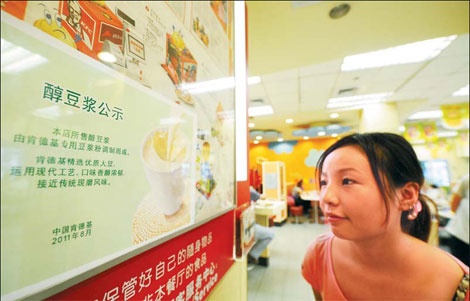 |
|
|
|
|||||||||||
|
 |
|
A notice in a Kentucky Fried Chicken outlet in Hefei, Anhui province. The China market has provided companies such as KFC stable and riskless returns as the country's middle class expands. [Photo/China Daily] |
Restaurant's parent provided best risk-adjusted return in the past year
Fiona Yao, a 32-year-old accountant, passed up a bowl of steaming noodle soup in favor of spicy chicken wings and a burger for lunch from a Kentucky Fried Chicken outlet in a Shanghai shopping mall.
"I almost don't take KFC as a foreign brand," said Yao who paid 30 yuan ($4.80) for her meal at the SuperBrand mall. "The Chinese love to eat chicken and everyone can afford it."
Chinese consumers like Yao are one reason that Yum! Brands Inc, KFC's parent, provided the best risk-adjusted return in the past year among 113 companies that are either based in China or get at least 25 percent of their revenue from there, the Bloomberg Riskless Return Ranking shows. Yum! gained 1.63 percent after adjusting for volatility, followed by Mead Johnson Nutrition Co, a maker of infant formula based in Glenview, Illinois, which returned 1.58 percent.
The US consumer companies topped the ranking after China's emerging middle class turned to Western food products as a sign of growing wealth. While a Hong Kong-based casino venture had the highest total return, multinational companies such as Yum! and Mead Johnson are less volatile because they're more diversified and viewed as less susceptible to changes in the local economy and interest rates.
"They're able to tap into China as an additional source of growth at the minimum risk," said Jeff Papp, a senior analyst in Lisle, Illinois, at Oberweis Asset Management Inc, which manages $700 million including Chinese stocks, though not Yum! or Mead. "They have a very strong foreign brand and at the same time they don't get 100 percent of their revenue from China, just the growth part of it. The perception is that it's a safe way to play China."
The Bloomberg ranking included 19 US companies that earn at least a quarter of their annual revenue in China, the 54 most-traded Chinese companies with shares listed in the US, and 40 mainland Chinese firms traded in Hong Kong.
Shares of Yum!, based in Louisville, Kentucky, returned 40 percent in the year through March 30, five times the advance of the Standard & Poor's 500 Index. Spun off from PepsiCo Inc in 1997, Yum!, which also owns Pizza Hut and Taco Bell, boosted net income excluding certain items by 62 percent over the past five years as the portion of its revenue derived from China more than tripled.
Yum's volatility, a measure of price swings, came in at 25 over the past year, the second-lowest after China Mobile Ltd, the world's biggest phone company by subscribers. The 10 most volatile companies in the ranking were all based in China.
PepsiCo acquired the then Kentucky Fried Chicken Corp in 1986, 22 years after it was sold by entrepreneur Harland Sanders, known as the colonel, for $2 million to private investors. Sanders' image still adorns restaurants and packaging.
Mead Johnson, the world's largest standalone baby formula manufacturer, has a volatility of 27, the third-lowest. The company got more than 29 percent of revenue from China in 2011. Profit has climbed 28 percent since 2006.
Yum! and Mead Johnson were the only companies that stayed in the top 10 for volatility-adjusted returns over three years. The risk-adjusted return is calculated by dividing total return by volatility and isn't annualized.
Since opening its first KFC outlet 25 years ago, Yum! has become the most popular Western restaurant company in China.
The company added a new KFC or Pizza Hut restaurant every 14 hours in the world's fastest-growing major economy last year, extending its reach to 4,500 locations, more than double the number of McDonald's Corp, the world's largest restaurant company, according to company filings.
Yum! stock has surged 174 percent, including dividends, since March 2009 as 51 percent growth in Chinese revenue offset declines at its US business. While Yum!'s same-store sales fell 1 percent in the US last year, they grew 19 percent in China and 3 percent at other offshore locations, according to the company's filing.
The company has said it plans to open 600 new restaurants in China this year. Yum! has 18,000 KFC, Pizza Hut and Taco Bell outlets in the US, the company said in its annual report.
The company's recipe for success has been to adapt menus to local tastes, offering Chinese staples such as bacon and mushroom rice and egg tarts at KFC and upgrading Pizza Hut from the delivery outlet known in the West to a sit-down dining restaurant that sells wine, according to Sara Senatore, a senior research analyst at Sanford C Bernstein & Co in New York, who expects Yum! shares - currently trading at $70.71 - to climb another 10 percent to $78 in 12 months.
McDonald's Corp, based in Oak Brook, Illinois, has fewer than half of the stores that Yum! has in China, where it offers predominantly the same burger-driven menu found in its US outlets. McDonald's got 40 percent of its 2011 revenue from Europe, 32 percent from the US and 22 percent from the Asia-Pacific region, Middle East and Africa, according to data compiled by Bloomberg.
Bloomberg News